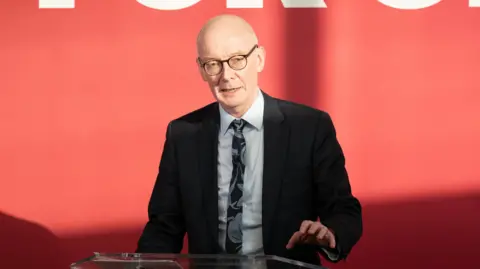Government needs to think like a start-up, says minister
 PA Media
PA MediaA cabinet minister has urged "disrupters" to join the civil service in a bid to make government "think a little bit more like a start-up".
Pat McFadden, who oversees the Cabinet Office, said officials needed a greater "appetite for risk" to deliver public services more effectively.
In a speech, he said he wanted Whitehall to follow the "test and learn culture" at leading tech companies.
He insisted he was not criticising civil servants themselves, after a row over remarks by Sir Keir Starmer last week.
The prime minister was accused by a civil service union boss of using "Trumpian language" after saying too many officials were "comfortable in the tepid bath of managed decline".
Sir Keir's speech reflected frustration that some in government have privately expressed about the civil service's effectiveness.
But in a speech in east London, McFadden struck a more conciliatory tone, noting that civil servants themselves were "frustrated" by the way government works.
"The people are good, but the systems and structures that they work in are too often outdated," he added.
Nevertheless, he added that he did want to see a shake-up to civil service recruitment processes to encourage outsiders to apply.
Referencing a high-profile call from Boris Johnson's former adviser Dominic Cummings for "weirdos and misfits" to enter government, he said he wanted to see more "creative thinkers" take on policy problems.
"Whatever term you want to use, we do want innovators and disrupters and original thinkers," he added.
This included shaking up a recruitment process that can seem "mind-bogglingly bureaucratic and off-putting" to outsiders, he added.
Pay 'challenge'
His department has confirmed a third wave of recruitment for a scheme under which tech workers are encouraged to join the civil service for secondments lasting between six months to a year.
Under the Innovation Fellowship Programme, set up by the previous Conservative government, recruits are paid a salary up to £85,000 to help find technology-based solutions to problems in delivering public services.
However, he admitted that public service pay constraints would likely prove a "challenge" when it came to enticing new recruits from tech companies.
"Many of the people probably could earn more working in the private sector, so we are appealing to their sense of public service," he conceded.
The cabinet minister also said he wanted to see increased take-up of new technologies such as artificial intelligence (AI) to improve public services - something also promised by the previous government.
Whereas the Conservatives framed technology as a way to cut the size of the civil service, however, McFadden said he did not have a "target for headcount" and his "focus" was on making officials more productive.
'Glib platitudes'
He also confirmed details of two projects to test out a new model of using "test and learn teams" to find "innovative ways to fix problems".
Two early pilots, to begin in January, will see officials asked to improve the delivery of temporary accommodation to homeless families in Essex and Liverpool, and family support in Manchester and South Yorkshire.
The model will then be deployed to help the government hit new "milestones" set out by the prime minister last week, including ending hospital backlogs and improving neighbourhood policing.
Shadow Cabinet Office minister Richard Holden said Labour would "swell the size and cost of the state", adding that it had opposed Tory plans before the election to shrink the civil service to pre-Brexit levels.
"Labour ministers talk tough, but from bitter experience we know that's all it is - glib platitudes and broken promises with British taxpayers picking up the bill," he added.

Sign up for our Politics Essential newsletter to read top political analysis, gain insight from across the UK and stay up to speed with the big moments. It'll be delivered straight to your inbox every weekday
